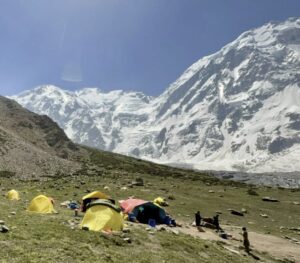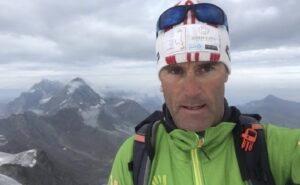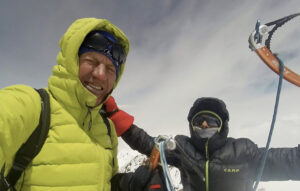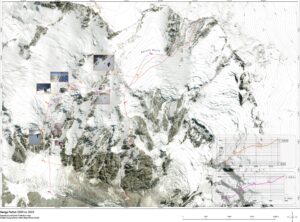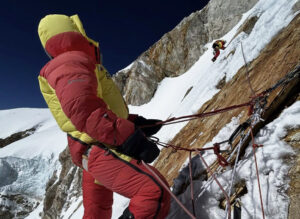Helicopters have flown all day up and down Annapurna, changing potential tragedy into relief and salvation for some. Climbers may all be down now, but this is currently unconfirmed.
Questions about Kaur’s summit climb
At least six climbers were airlifted today. Baljeet Kaur had been left for dead but was finally found at 7,400m and is now in the hospital. Outfitter Pioneer Adventure posted that helicopter pilot Cloudy Martin of Kailash Helicopter Services, with Mingma Dorchi at his side, located and rescued Kaur at 7,600m on an extremely difficult long-line operation.
We have asked them how Kaur and the two Sherpa guides who climbed with her became separated. No word yet from Pioneer Adventure. The Indian climber, who used no supplementary oxygen, became lost shortly after starting down from the summit. There is no news on her Sherpas’ whereabouts, although Pioneer Adventure did say, “Everybody is safe (?) and the clients are in Pohkara.”

The rescue helicopter spots Baljeet Kaur lying in the snow earlier today. Photo: Mingma Dorchi/Pioneer Adventure
Six evacuated — and the rest?
Helicopters from several rescue companies also picked up also Indian Arjun Vajpai, Pakistan’s Naila Kiani and Shehroze Kashif, and France’s Jonathan Lamy. Nepal Army Captain Suman Panday, who led a climbing and cleaning expedition, was also evacuated from Camp 3 with snow blindness, The Himalayan Times reports. Noel Hanna’s remains were also retrieved from Camp 4 and taken to Kathmandu.

Helicopter pilot Sobit Gauchan (left) and Nepalese guide Suman Gurung during the operation to evacuate Jonathan Lamy today from Camp 3. Photo: Suman Gurung/Instagram
Khoo Swee Chiow of Singapore, who had joined the summit push with other climbers on the Seven Summit Treks team, has just reported that he didn’t summit. He is currently back in Pohkara but provided no further details.
It remains unclear how many people are still on the mountain. We don’t know whether the Sherpa climbers leading the clients have also been evacuated. A group was also looking on foot for missing Indian climber Anurag Maloo. He fell into a crevasse yesterday at around 6,000m.

As he feared, Jonathan Lamy has sustained some frostbite, but notes (in French): “Nothing serious.”
#BringAnuragback
While the prospects look grave, Anurag Maloo’s friends and family are not giving up hope of finding him alive. They are pressuring politicians (including India’s Minister of Foreign Affairs), influential figures, and general audiences to keep up the search. There is a petition on Change.org asking for signatures and to locate a thermal camera to use in the search. All under the hashtag #BringAnuragBack.

Anurag Maloo’s family has made public his last confirmed location, as given by Seven Summit Treks. Here is the exact point on Google Earth.
Time is of the essence since the weather is expected to worsen quickly. A major storm will hit most of Nepal’s mountains throughout the week.
Climbers trapped in Camp 4
The remaining question is, why were climbers stuck in higher camps since yesterday? Early this morning, they should have descended as fast as possible, but no one seemed to move. It turns out that an avalanche swept part of the route between Camp 4 and Camp 3 and took the fixed ropes with it. Most climbers on Annapurna relied on those fixed ropes. In addition, conditions were clearly far from safe.

High Camp (Camp 3?) on a platform amid seracs on Annapurna. Photo: Baljeet Kaur
This year, Camp 4 was set up much lower than usual, at some 6,700-6,800m, while Camp 3 was just a little lower, at 6,500m. That is also why the summit day was so long. Kiani and Kashif needed nearly 24 hours to get to the summit and back to Camp 4 on Sunday, sources in Pakistan reported.
Dinev’s bad luck was good luck
Bulgarian climber Gospodin Dinev, who was attempting to climb the mountain without oxygen or personal Sherpa support, suffered an unfortunate episode that may have saved his life. During the summit climb, his backpack with all his gear slid away down the steep slope. Dinev had to abort his summit push and go down some 1,000 vertical meters until he found his backpack at 6,400m.
“At that precise moment, an avalanche fell in the higher reaches of the mountain,” Bulgaria’s National Radio reported.
Safe at Base Camp and not ready to give up yet, Dinev says he will stay until conditions improve again.

File image of Gospodin Dinev. Photo: BNP.bu
He’ll need considerable patience. Forecasts announce a long stormy spell that will paralyze activity in the mountains and keep helicopters grounded at least until next week.
So everyone still in the mountains should go down as soon as possible.
First groups fared best
In the end, luck sided with those who opted to push for the summit on April 15, right behind the rope-fixing team. This included both the entire Imagine Nepal group and also EliteExped’s three clients and six supporting Sherpas.

Suman Gurung on the summit of Annapurna, April 15. Photo: Suman Gurung/Instagram
Bartek Ziemski and Oswald Rodrigo Pereira of Poland summited yesterday. Their fast ascent and descent, with Ziemski on skis all the time, allowed them to reach Base Camp quickly and avoid the avalanche that swept away the fixed ropes.
Some days earlier, they had a bad experience with another huge avalanche during their first acclimatization round. That snow slide buried a depot that the climbers had left at 5,700m, with the necessary equipment for their summit push. They were either able to dig it out or replace it with spare gear from Base Camp.

